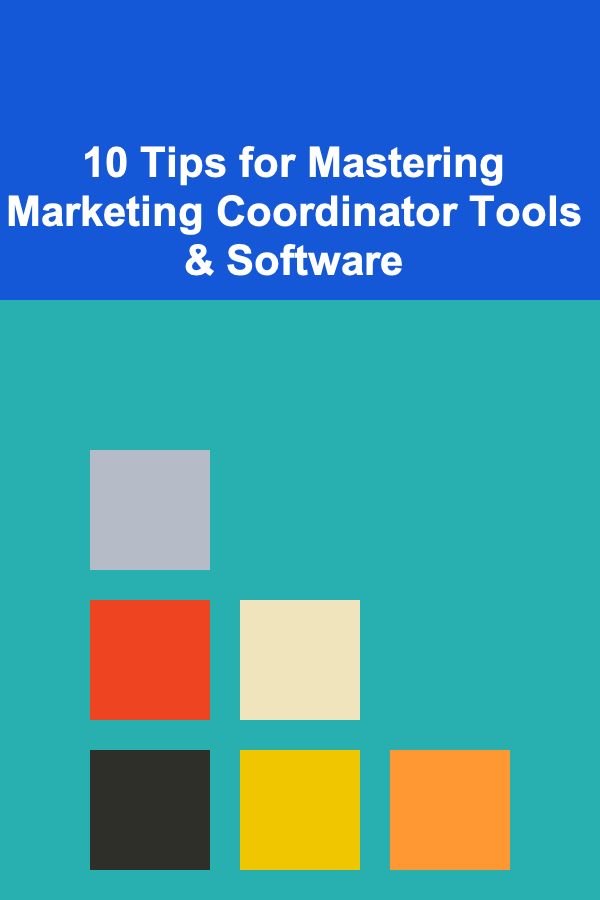
10 Tips for Mastering Marketing Coordinator Tools & Software
ebook include PDF & Audio bundle (Micro Guide)
$12.99$9.99
Limited Time Offer! Order within the next:

Marketing coordination is a multifaceted and dynamic role, requiring professionals to manage campaigns, track performance, and ensure seamless communication among various stakeholders. The success of a marketing coordinator largely depends on their ability to use the right tools and software effectively. The right technology can streamline workflows, automate repetitive tasks, and provide in-depth insights that drive smarter decision-making.
In this article, we'll discuss 10 essential tips for mastering the tools and software that can help marketing coordinators improve productivity, efficiency, and collaboration. Whether you're a seasoned marketing coordinator or just getting started, these tips will provide you with a solid foundation for success.
Choose the Right Project Management Software
Project management tools are vital for any marketing coordinator, helping to keep track of tasks, timelines, and team collaborations. Choosing the right tool can improve your team's efficiency and keep everyone aligned on goals.
Key Tools to Consider:
- Trello: A visually intuitive tool that uses boards, lists, and cards to manage tasks and projects. Great for smaller teams and simpler workflows.
- Asana: Known for its task-tracking capabilities, Asana helps teams assign tasks, set deadlines, and monitor progress across marketing projects.
- Monday.com: A highly customizable platform that is excellent for tracking marketing campaigns and large projects with multiple stages.
Why It's Important:
A well-organized project management tool keeps your campaigns on track and prevents deadlines from slipping through the cracks. Mastering one or more of these tools allows you to delegate tasks effectively and ensure the smooth execution of marketing strategies.
Leverage Social Media Management Platforms
Social media is one of the most important channels for digital marketing. For marketing coordinators, managing multiple social media platforms, scheduling posts, tracking engagement, and analyzing performance can be overwhelming without the right tools.
Top Social Media Management Tools:
- Hootsuite: Schedule posts, track engagement, and analyze social media metrics across various platforms all from one dashboard.
- Buffer: Another popular option for scheduling posts and analyzing social media performance. Buffer also provides easy collaboration features for teams.
- Sprout Social: Great for teams that need a detailed social listening tool in addition to scheduling posts. It also offers powerful analytics and reporting features.
Why It's Important:
Social media management tools help marketing coordinators save time by automating posting schedules and centralizing performance metrics. Mastering these tools allows you to track your campaigns' success and adapt strategies accordingly.
Utilize Email Marketing Software
Email marketing remains one of the most effective ways to engage with your audience. Marketing coordinators can benefit significantly from mastering email marketing software that automates campaigns, tracks performance, and personalizes content.
Popular Email Marketing Tools:
- Mailchimp: A widely used platform that allows users to design emails, manage lists, and track performance with ease. Mailchimp also offers useful automation features.
- SendinBlue: Known for its robust features, SendinBlue includes email marketing, SMS campaigns, and marketing automation tools, making it versatile.
- HubSpot: Ideal for businesses using inbound marketing, HubSpot offers integrated CRM, email marketing, and automation tools for a unified strategy.
Why It's Important:
Mastering email marketing software allows you to send personalized, timely emails that resonate with your audience. You'll also be able to track open rates, click-through rates, and conversions, refining your email strategies to maximize engagement and ROI.
Harness the Power of Analytics Tools
Data is crucial in marketing, as it helps track performance, understand customer behavior, and inform future decisions. To be an effective marketing coordinator, it's vital to master analytics tools that provide clear, actionable insights.
Essential Analytics Tools:
- Google Analytics: The industry standard for tracking website performance. It provides in-depth information on site traffic, user behavior, and conversion tracking.
- Hotjar: A tool that focuses on visualizing user behavior through heatmaps, session recordings, and surveys.
- Kissmetrics: Great for tracking customer behavior across multiple touchpoints and providing insights into customer retention.
Why It's Important:
Analytics tools allow marketing coordinators to assess the effectiveness of campaigns, optimize strategies, and identify areas for improvement. Mastery of these tools enables data-driven decision-making, which is key to optimizing marketing efforts and increasing ROI.
Streamline Communication with Team Collaboration Tools
Effective communication among team members and stakeholders is a cornerstone of successful marketing campaigns. Collaboration tools help keep everyone aligned on tasks, deadlines, and deliverables.
Top Team Collaboration Tools:
- Slack: A messaging platform that enables real-time communication and file sharing. Slack also integrates with various project management and marketing tools.
- Microsoft Teams: Offers chat-based communication, file sharing, and video conferencing, all in one place. Teams integrates well with other Microsoft tools like Word and Excel.
- Google Workspace: A suite of productivity tools (Docs, Sheets, Slides, etc.) that facilitate easy collaboration and document sharing in real time.
Why It's Important:
Mastering collaboration tools helps ensure that your team is always on the same page and working efficiently. These tools help reduce miscommunication, streamline approvals, and keep projects moving forward without delays.
Master Content Management Systems (CMS)
Content is at the heart of digital marketing, and managing your website's content is essential for marketing coordinators. CMS platforms enable you to create, edit, and publish content without the need for deep technical knowledge.
Popular CMS Platforms:
- WordPress: The most widely used CMS, offering a wide variety of plugins and customization options.
- Wix: A drag-and-drop website builder that's easy for beginners to use, offering a variety of templates and features.
- Squarespace: Known for its beautifully designed templates, Squarespace is ideal for creating visually appealing websites with ease.
Why It's Important:
Mastering a CMS allows you to quickly update website content, launch blog posts, and make necessary changes to pages without relying on developers. This flexibility is crucial for keeping your website fresh and optimized for SEO.
Automate Marketing with CRM Software
Customer Relationship Management (CRM) software is crucial for marketing coordinators to manage customer data, track interactions, and automate certain aspects of the marketing process. By leveraging CRM tools, you can ensure that your marketing is aligned with customer needs and behaviors.
Leading CRM Tools:
- Salesforce: One of the most powerful and customizable CRM systems, Salesforce offers a range of tools for automation, customer segmentation, and marketing analytics.
- Zoho CRM: A more affordable alternative to Salesforce, Zoho offers a comprehensive suite of CRM features, including automation and integration with marketing tools.
- HubSpot CRM: A free and easy-to-use CRM that integrates seamlessly with HubSpot's marketing tools, making it an excellent choice for small to medium-sized businesses.
Why It's Important:
A well-managed CRM helps you automate and track customer interactions, improving customer retention and segmentation. Mastery of CRM software enables more personalized marketing efforts and enhances customer experience.
Manage Ad Campaigns with Advertising Platforms
Paid advertising is a key part of many marketing strategies, and marketing coordinators must know how to manage and optimize ad campaigns across various platforms. Mastering advertising tools is crucial for reaching the right audience at the right time.
Popular Advertising Tools:
- Google Ads: A leading platform for search engine marketing, allowing you to create and manage paid search ads.
- Facebook Ads Manager: A tool for managing ads across Facebook and Instagram, offering a range of targeting options.
- LinkedIn Ads: Best suited for B2B marketers, LinkedIn Ads allow you to target professionals with precision.
Why It's Important:
Mastering advertising platforms helps you optimize ad spend, target the right audience, and measure campaign performance. With these tools, you can drive traffic, increase conversions, and maximize the impact of your marketing campaigns.
Use Graphic Design Software for Visual Content
Visual content plays an essential role in marketing, from website design to social media posts. Knowing how to create and edit compelling visuals is an important skill for marketing coordinators.
Graphic Design Tools:
- Canva: A user-friendly design tool that offers templates for social media posts, presentations, and more. It's great for marketing coordinators who need quick, polished designs without a graphic designer.
- Adobe Creative Suite (Photoshop, Illustrator, etc.): The industry standard for professional design, offering advanced features for creating high-quality visuals.
- Figma: A cloud-based design tool, perfect for team collaboration on design projects, especially for websites and mobile apps.
Why It's Important:
Graphic design tools help you create engaging content that stands out. Mastering these tools enables you to produce high-quality visuals that enhance the effectiveness of your marketing campaigns.
Stay Organized with Time Management Tools
Marketing coordinators juggle many tasks simultaneously, so effective time management is essential. Time management tools can help you prioritize tasks, stay on schedule, and prevent burnout.
Time Management Tools:
- Toggl: A time tracking tool that helps you monitor how long you spend on different tasks, allowing you to identify areas for improvement.
- RescueTime: Automatically tracks the websites and apps you use throughout the day, helping you assess productivity and time-wasting habits.
- Focus Booster: A Pomodoro technique-based tool designed to help you work in focused intervals, boosting productivity.
Why It's Important:
Time management tools ensure that you are spending your time efficiently, avoiding distractions, and keeping deadlines in check. Mastering these tools helps you balance your workload, improve productivity, and maintain a healthier work-life balance.
In conclusion, marketing coordinators who are proficient in using the right tools and software can significantly improve their efficiency and the overall success of their marketing efforts. By mastering project management, social media, email marketing, analytics, and design tools, marketing coordinators can streamline their workflows and deliver high-quality campaigns that drive results.
Reading More From Our Other Websites
- [Home Pet Care 101] How to Create a Pet Emergency Plan: Protect Your Furry Friend in Times of Crisis
- [Home Holiday Decoration 101] How to Create a Festive Holiday Garland That Adds Warmth to Your Home
- [Home Budget Decorating 101] How to Create a Statement Wall on a Budget
- [Organization Tip 101] How to Organize Your Bookshelves with a Minimalist Approach
- [Home Family Activity 101] How to Start a Family Book Club with Engaging Reads
- [Home Lighting 101] How to Use Lighting to Highlight Your Artwork and Decor
- [Personal Care Tips 101] How to Choose the Best Eyeliner for Your Eye Shape and Skin Tone
- [Home Maintenance 101] How to Clean and Maintain Your Home's Windows and Screens
- [Home Storage Solution 101] How to Use Vacuum Storage Bags for Wardrobe Storage Solutions
- [Personal Care Tips 101] How to Make the Most of Your Antiperspirant During Busy Days

How to Make Money Online as a Flight Attendant: 10 Actionable Ideas
Read More
How to Soundproof Your Home on a Limited Budget
Read More
How to Use One-Page Websites for Event Invitations and Registrations
Read More
The Ultimate Guide to Thrifty Gift-Wrapping Ideas for Every Occasion
Read More
How to Cook Middle Eastern Delights
Read More
How to Design Logos That Stand the Test of Time
Read MoreOther Products

How to Make Money Online as a Flight Attendant: 10 Actionable Ideas
Read More
How to Soundproof Your Home on a Limited Budget
Read More
How to Use One-Page Websites for Event Invitations and Registrations
Read More
The Ultimate Guide to Thrifty Gift-Wrapping Ideas for Every Occasion
Read More
How to Cook Middle Eastern Delights
Read More